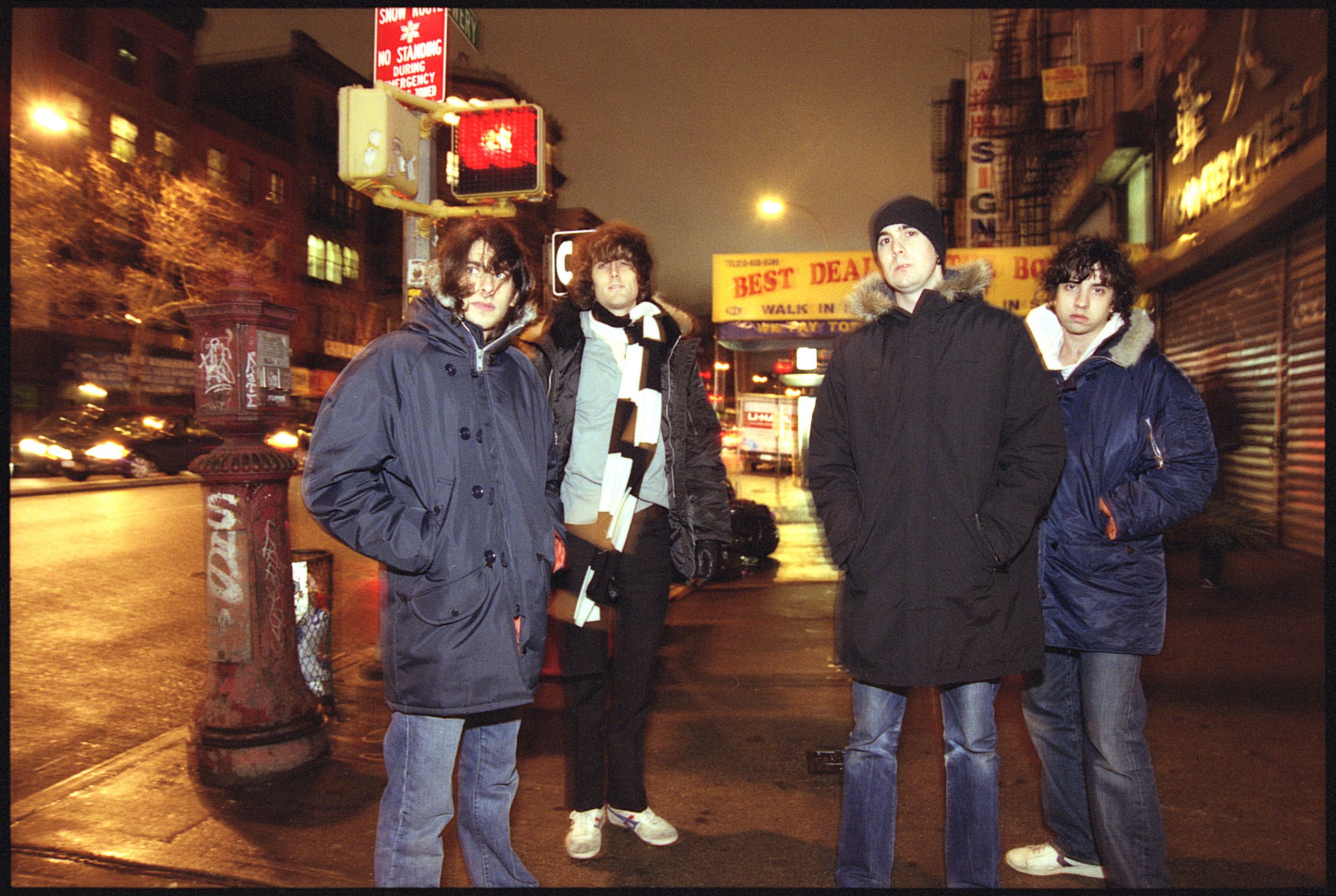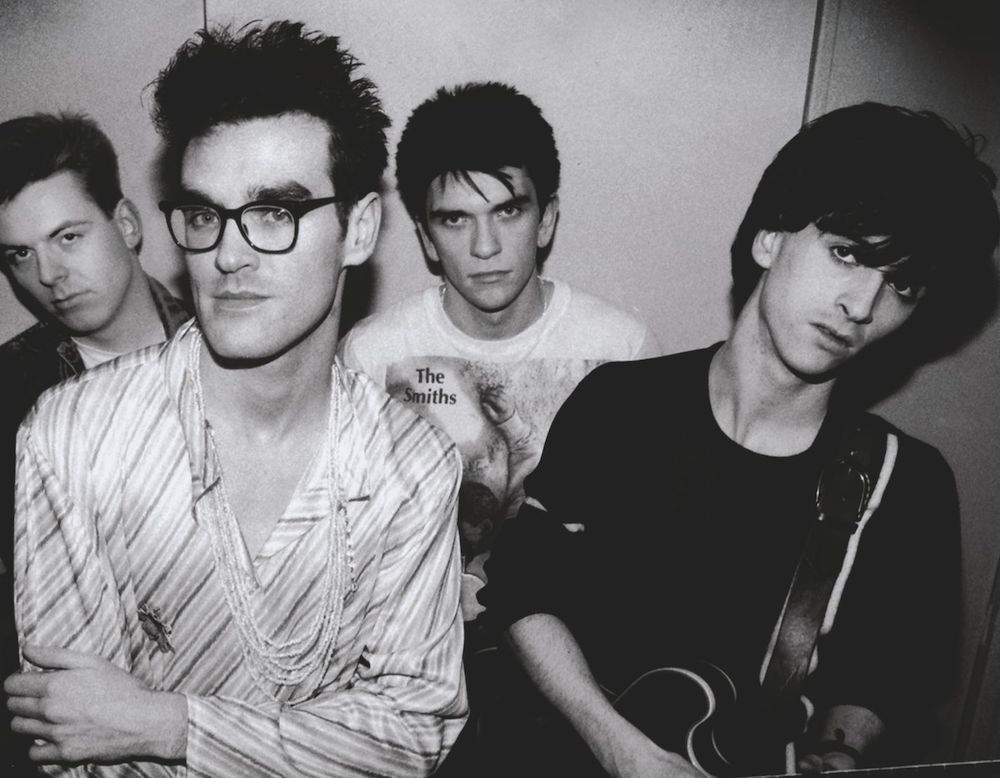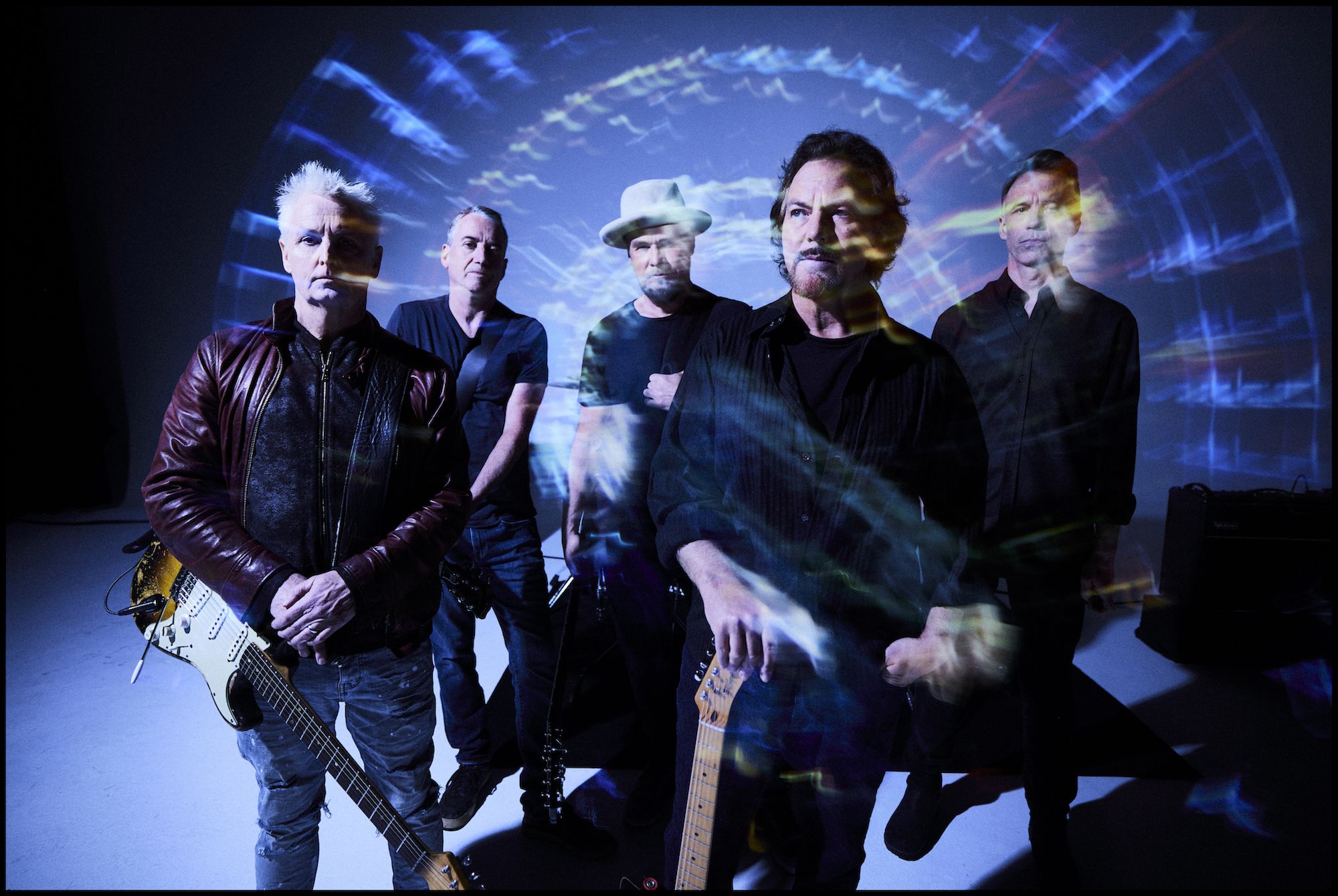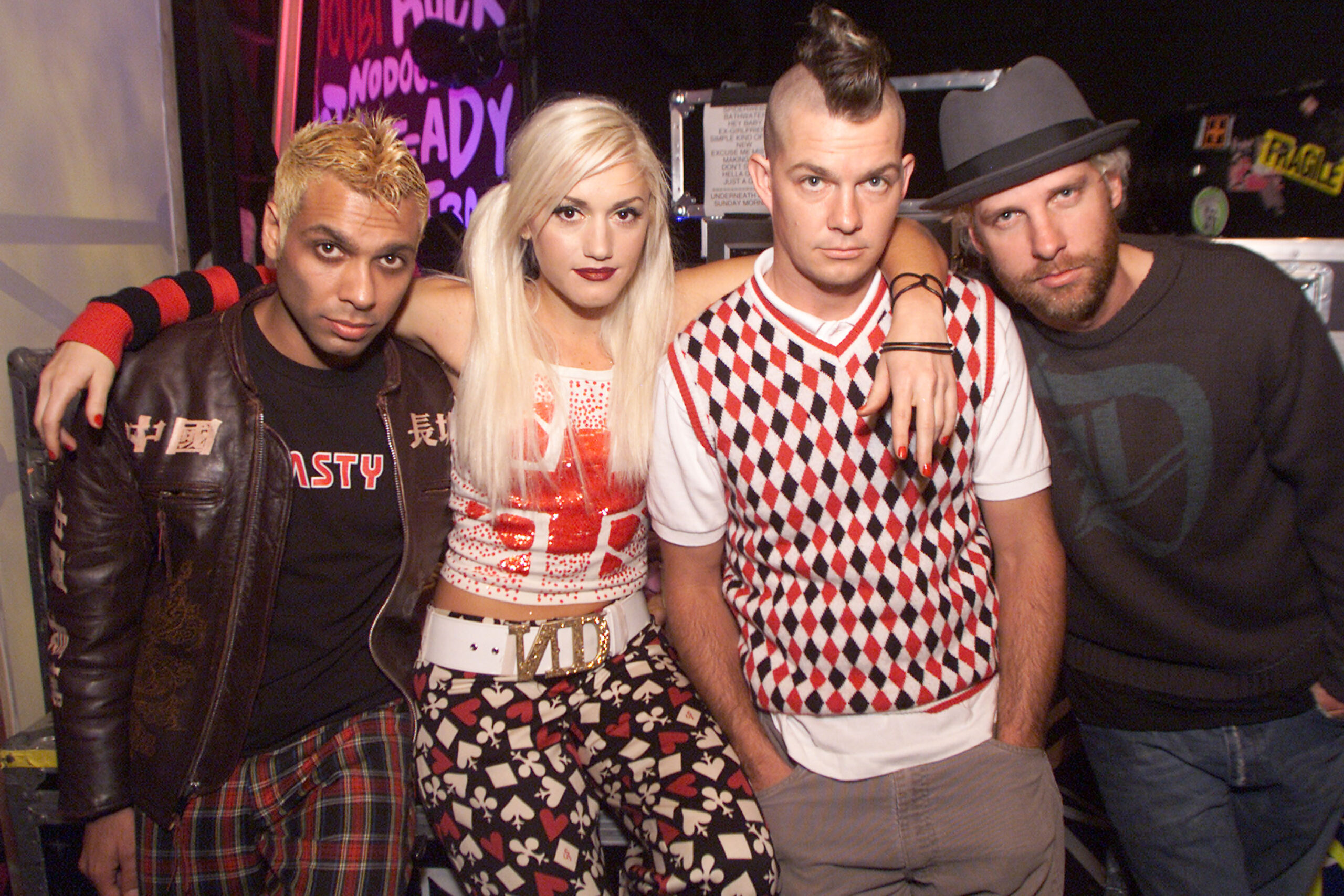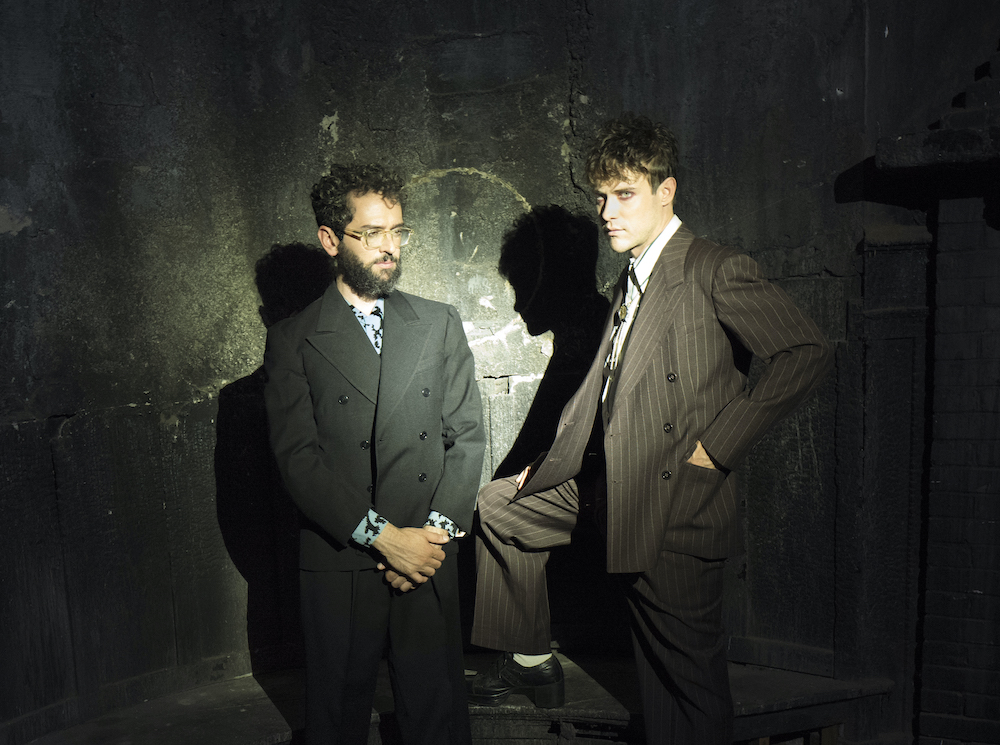Do you remember what the early aughts felt like? The smell of leather jackets and canvas shoes pressed into vinyl booths, stage dives at dive bars, alternate cover art and lost tracks internalized into "if you know, you know" attitudes. At least that's the mythos we remember, a perception built in New York and then distributed via the burgeoning blogging and RSS-based "Web 2.0" across the rest of the nation. The novelty of being tuned in in real time coupled with the high concentration of classic albums coming out of a relatively compact setting created a magical tension in the air, a mixture of sawdust and gunpowder that could ignite at the strike of a well-mic'd kick drum. The next big thing felt like it was perpetually coming, a groundswell you could feel both in the streets and on the virtual highways.
But like New York itself, the scene that was once a bastion of cultural credibility has entered a middle age that's traded the cheap thrills of gutters and garages for the more refined high of warehouse breweries, Instagrammable brunch, and "fast casual." Times change before you can realize they were already gone, and it wasn't until the publishing of Lizzy Goodman's excellent oral history Meet Me In The Bathroom in 2017 that many learned the city's rock renaissance of the early millennium had officially become a "once was" rather than anything that still lives and breathes today.
If closing the chapter on the era struck you as narratively premature, the characters that comprised the story didn't seem to mind. A number capitalized on the book's popularity to cash in on the nostalgia they'd accrued in the years since the "fever to tell" died down. Later that year, the Yeah Yeah Yeahs -- now more than half a decade from releasing their last LP -- reissued a massive box set of their breakout debut, coinciding with coastal shows built around performing the album in full. Interpol pulled a similar stunt the month before, building concert events around running through all of their landmark Turn On The Bright Lights in New York and Los Angeles.
The Rapture's comeback -- beginning with a surprise set at Brooklyn's Gold Room last week and a show at Music Hall Of Williamsburg tonight -- missed that ideal timing, a window when everyone was fondly reminiscing about how cool Manhattan used to be and felt warm at the thought of a jewel CD case. But regardless of when they reemerged, the group would inevitably have had to contend with a moment when the last bands to feel like the biggest in the world are returning to one that's largely left them behind. LCD Soundsystem’s grand reintroduction at Coachella in 2016 was one of the festival's least attended headlining sets since the Stone Roses, marking the former as a legacy act of the same caliber as the latter in the accelerated internet age. The Strokes, Franz Ferdinand, and the Killers, once rock stars of untouchable cool, now shrug off dispirited routine releases to fund the more expressive side projects they prefer to invest their time in.
The breakup of the Rapture in 2014 was already a muted affair, based around a never-official pull-quote from DFA's manager Jonathan Galkin that prompted the individual members to air out some vague grievances that were being hashed out behind the scenes. The announcement of their reunion this February was similarly treated almost entirely with a shrug, their name appearing on Just Like Heaven's nostalgia-leaning lineup without prior announcement followed by a cautious confirmation from the bandmates that while yes, they're back, they know about as much of what that means as you do. Their presence on the poster -- sitting between a Passion Pit Manners anniversary show and artists with once inescapable hits like Miike Snow and STRFKR that now induce lethologica upon trying to remember who was behind them -- has qualified their revival as not a new lease on life but a final joyride for anyone still sentimental about iPod classics.
All of this greatly contrasts with how the Rapture's career felt at the onset. "House Of Jealous Lovers" was a moment that started a movement, beating "Losing My Edge" to release by a few months as the ignition point of the new dance-punk wave that seemed to represent the only possible path forward for rock music. Yes, cowbell was once considered the crucial totem that would save rock 'n' roll. The idea seems quaint today, but it also has yet to be surpassed by a better answer for how to bring the genre out of its ass and back to the masses. Today's bands have succeeded by leaning over the edge into monogenre, which is really just no genre at all, an approach that's either radically progressive or regressive depending on your point of view.
The Rapture's recipe, though, was unambiguous -- a molotov cocktail of Joy Division, Gang Of Four, and a little bit of Air that introduced DFA Productions to the world by dropping a sonic megaton on the dance floor. The team -- the band members Luke Jenner, Vito Roccoforte, Gabriel Andruzzi, and Mattie Safer alongside DFA's Tim Goldsworthy and James Murphy -- was savvy, releasing "House Of Jealous Lovers" on 12" vinyl to appeal not to rock radio but DJs at nightclubs. Rather than a simple sales strategy, the move read more as a mission statement: that alternative rock shouldn’t just be alternative to other rock bands, but to everything else out there.
And still, "House Of Jealous Lovers" is not the best the Rapture came to offer. The full-length that followed the single delivered that spark again and again, setting off a stylistic trend the band would leave for vultures as they moved on to newer spaces all their own, even if those never caught fire quite in the same way. Along their journey, they brought punk attitudes and rock sensibilities to the sounds of house, disco, and club music, assembling a collection of understated LPs that stands the test of time better than any of the wide-ranging source material they pulled from.
It's easy to forget now that the Rapture were not simply a niche act. They had every major label at their door and earned enough clout to find themselves in all the most prominent spheres of the decade to boast "I was there." They recorded with influential producers like Timbaland (for better) and Danger Mouse (for worse). They opened for the Sex Pistols in football stadiums and Daft Punk on one of the most legendary tours of this century. The dance-punk revival never realized its promise, falling apart a little more with every band that tried and failed to sustain the pace the Rapture broke out with. But unmoored from the unwieldy messiah complex endowed upon them before anyone knew what else they were capable of, the Rapture can be retroactively viewed as one of the most singular bands of their generation, entirely on their own terms. The following 10 songs prove it.
10. "Olio" (from Echoes, 2003)
Having raised the stakes of the turn-of-the-century rock revolution with "House Of Jealous Lovers," the Rapture immediately subverted all the impossible expectations projected onto their anticipated dance-punk manifesto with the album's opening salvo. Instead of diving headfirst into a mesh of screeching guitars and ceaseless treble, Echoes greeted listeners with a chilling synthesizer squiggle and thumping four-by-four, resembling something like Four Tet playing with Lite-Brite. Festering then oozing, Jenner's irreverent howl from the band's debut single is channeled here as a noirish moan lamenting a relationship that drifted apart, his heart pelted by time and ripped up in the shadows "over and over again."
"Olio" previously appeared on the band's debut mini-album Mirror, but here is unrecognizable from its original guitar, bass, and drums incarnation. Not unlike Radiohead's shift from OK Computer to Kid A, the Rapture transformed their frenetic post-punk stylings into an IDM crawler, except in their case they really committed to the electronica. Programmed drums set an icy, urgent tempo, bursts of bass bruise the headspace, and the role of their iconic cowbell's fervent tapping is played instead by a shifty single keyboard note. Where the band's skillset had seemingly been in unleashing uninhibited kinetic energy, the first song back following their breakthrough was all controlled imagery, impressionistic lyrics like "I remember before as your mouth/ It touched my face/ Small hands grabbing me/ Trapped in my thoughts/ You repeating like a machine gun" navigating roving cinematic mood lighting. It's an idiosyncratic expression of a style the band would never quite return to, one of many such one-offs across their catalogue.
9. "Out Of The Races And Onto The Tracks" (from Out Of The Races And Onto The Tracks, 2001)
The Rapture came to define their own branch of an exploding New York sound, and yet the band only seemed to wind up in the city by happenstance. Childhood friends from suburban San Diego, Jenner followed Roccoforte to San Francisco when the latter began college. Then he followed him into the Rapture when Jenner insisted Roccoforte learn drums so he wouldn't have to start a band with a stranger. What followed was further cycles of such seesawing, which is how the pair wound up in Seattle as black sheep on Sub Pop -- the alkaline sheen of Mirror suggesting a possible synchrony with the grunge-defining label before the band's quick about-face. Rather than cleanly move through a structured path laid out ahead of them, they instead followed their newly recruited bassist Safer on his advice to use their advance to buy a van and park up in New York.
The Rapture's locational track record already erratic, Sub Pop soon found themselves worn thin by their equally aimless creative process, amplified in inanity by the kindred spirits the band met in DFA Productions. James Murphy validated the Rapture's diversions as, "They'd rather be distorted and raw and have good energy than it be tepid and clean. It just takes time for them to be as free as they want to be and sound good." As both their songwriting approach and sound drifted further into the murk, Sub Pop gave them an out by releasing their earlier, more congruous demos as the Out Of The Races And Onto The Tracks EP and letting them proceed with their full-length debut on DFA.
The best of what the band once was, the title track on the chapter-clearing release also contains all the budding signatures DFA would eventually help bring to the fore: the hard-snapping elastic percussion, the tire-puncture yelps, the guitars strung with livewire. But it's also a clear remnant of a time when the Rapture thought of themselves first and foremost as a rock band, the song introducing its authors via their tools one at a time, beginning with a scratchy descending scale followed closely by a burbling bassline before the drums lock everything into marching orders and Jenner vaults off onto his commands to "shake" and "get yourself together." It's nervy proto-punk, not unlike turn-of-the-century Brit-barnstormers like Kasabian and the Vines. Had the band never met DFA, they wouldn't have been as revolutionary, but their energy would have ensured they'd still have been among the best outfits of the garage rock revivalist generation.
8. "The Devil" (from Pieces Of The People We Love, 2006)
"Pieces Of The People We Love" is quintessential Danger Mouse to a fault, softening the Rapture's bite to a nibble on a track that pulls the same tricks that the producer would later impart onto the Black Keys less successfully. A number of the songs on the rest of the album, helmed by Paul Epworth and Ewan Pearson, similarly tried to reign in a band that was at its best flagrant with its torn edges. Thankfully, they managed for much of the album to apply some polish without buffing out the band's scruff. The perforated "Get Myself Into It" runs an undercurrent of fussy sax through an effortless earworm that loops like a hymn; "Down For So Long" reimagines the band as a '60s psychedelic outfit with surprisingly rich results. But the only song that translates all of the restlessness and recklessness of their debut into the swing and shine of their major label rebirth is "The Devil."
Luke Jenner delivers a full-on homily indicting the fast life built on luminous, bustling Chic-like guitars and a wobbling rhythm skirmish. It's an impassioned sermon that eventually breaks down to tongues on the chorus, Jenner giving King Of Pop squeals with unselfconscious commitment. By the midway point, the disco-esque jaunt starts losing control like a fried motherboard, with panting and shrieking giving way to a key change that hits like cocaine into crudely holy heights. There's a spotlight guitar solo followed by sprightly fretwork, all as part of a full-on classic rock finale fade-out that could bring a whole congregation to their feet. On their next album the band would continue to weave religious themes into dance numbers, but "The Devil" was the first time they'd made dance music sound like church.
7. "Heaven" (from Echoes, 2003)
"Heaven" is the Rapture song that most lives up to the group's moniker. The band slant a joyous nursery rhyme into something sinister like they're in a B-movie horror film, then launch into a cacophony of steel-stringed clanging that sounds like a bridge bending into buildings as a result of some geological cataclysm. The central lyric -- "I can't believe that you came here today and you took me away" -- reads interpersonally but Jenner delivers it biblically. He sounds like he's leading a crowd to evacuate via megaphone, before leaning back into the pinball of percussion rattling and whirring behind him. Where the band's apocalyptic leanings typically channeled themselves into something reminiscent of Y2K on Echoes, "Heaven" is more Mad Max than The Matrix, imparting a sense of physical hazard in addition to a spiritual one.
6. "No Sex For Ben" (from The Music Of Grand Theft Auto IV, 2008)
Remember when it came out that James Murphy had recorded a song with Britney Spears and our collective imaginations went wild with the idea of how LCD Soundsystem could revolutionize the pop mainstream? The Rapture recording with Timbaland is like the opposite of that; would mainstream pop kill the most potent band of their moment? The band had already risked smoothing out their corners on the pillowy Pieces Of The People We Love, but Timbaland could have easily tipped the balance too far. Of course, Future Sex/Love Sounds came out the same week as Pieces Of The People We Love, and the former was the most revolutionary dance music to come out since the Rapture's debut. For the discerning, you could imagine Timbaland and the Rapture making for the most exciting combination of seemingly incongruous talents since Aerosmith and Run-DMC.
The reality followed neither of those prospective paths. Instead, the two genre-breaking gamechangers came together and sounded like...Midnight Vultures-era Beck? "No Sex For Ben," recorded for the Grand Theft Auto IV soundtrack -- and at one point, before label intervention, featuring Justin Timberlake himself after he popped in from an adjacent studio session -- was a take-the-piss diss track aimed at Safer's friend Ben Rymer of Fat Truckers. Timbaland adds to the extended inside joke, which features lyrics like "lookin' like a poor man's Arthur Baker" and "try to snatch the kitty off his girlfriend's mother," breathy beatboxing and burbles within the latticework of cowbell. None of it makes sense, but it's also completely addicting. Safer, who eventually left the band before their next album due to creative struggles with Jenner, wanted to push them further in this direction, and it's fascinating to think of the band the Rapture would have become if they pursued his vision instead of Jenner's gospel-inspired new beginnings. But it's probably for the best, because it's doubtful the band would ever make all the illogical elements that congealed so hypnotically on "No Sex For Ben" click again.
5. "In The Grace Of Your Love" (from In The Grace Of Your Love, 2011)
For their third studio album, DFA homecoming, and first release following Safer's departure and a five year hiatus that saw Jenner lose his mother and have his first child, the Rapture stretched their gawky limbs skyward towards revelation. They teamed up with producer Philippe Zdar, who was behind the boards for Phoenix's commercial juggernaut Wolfgang Amadeus Phoenix. Rather than similarly position the band as the future of indie commercial syncs and possible festival headliners, however, Zdar brought out a more homespun beauty in their music still akin to WAP's lithium levity and blushing bloodrush. "There's a warmth to the band that never got captured [prior]," Jenner said of the album. "Yes there is this sound to the band which is this scratchy, anxiety riddled, overly smart kids with too many records for their own good, but people said we also had a warmth that never came through and I think Philippe focused on that."
The heartbeat circulating in each of the tracks on In The Grace Of Your Love pumps at a reverent, relaxed pace that the band's previous records skipped for riotous adrenaline. Relative to the frenzied retaliatory attitude they perfected on whipcrack singles like "The Coming Of Spring" and "Killing," their new music calmly surrendered to a higher calling. It's gospel with all four on the floor, evidenced by the textural jaunt of "It Takes Time To Be A Man" or the longing expanse of "Sail Away" -- think "Love Like A Sunset" channeled through "Hallelujah." The album is the most at ease the band has ever sounded, the split creativity that brewed division on Pieces Of The People We Love settling with the remaining trio into their most communally collaborative recording experience. The title track is a simple prayer, sweet and unhurried, building but never breaking over five minutes -- lavender floodlights and low-thrumming chimes encasing listeners in its even-tempered embrace.
4. "Whoo! Alright -- Yeah...Uh Huh." (from Pieces Of The People We Love, 2006)
James Murphy was not pleased with the Rapture's decision to leave DFA for Universal following the massive success of Echoes. He and Tim Goldsworthy had broken the band, gifting them a trademark sound that would make them the faces of a movement they'd only end up stripping for parts. Yet Murphy got as much out of the Rapture in turn, his own band germinating out of the fertile soil "House Of Jealous Lovers" laid out. LCD Soundsystem ultimately took the song's cues and transcended them entirely. Despite the bitter feelings in those fractured years before DFA and the Rapture finally made amends for their third studio album, the latter had not abandoned the spirit of their partnership. You can take the Rapture out of DFA, but you could never take DFA out of the Rapture.
"Whoo! Alright -- Yeah...Uh Huh." was the closest the Rapture would ever come to sounding like LCD Soundsystem. But it also blends in elements of the distinctly NME point of view that christened the Rapture alongside bands like the Hives. Lovingly shorthanded to "WAYUH," the second single from the band's second album was a brazen mashup of "Daft Punk Is Playing At My House" and "Tick Tick Boom." But it's also wilder, more adventurous, and more ambitious than either of those emblematic of-their-moment singles. The elements are all there: the topographic, overly literate satirical poetry, the percussive onomatopoeia, a very Nancy Whang-ish bridge melody combined with Gavin Russom-esque digitized flourishes. All the while, Safer orates from the center like a disgruntled futurist condemning the masses for not getting it yet. Whether it's brilliant or grating is the question the song itself sets out to skewer, but is also an easy one to answer: "WAYUH" is Safer's defining contribution to the Rapture, and the greatest setlist casualty from his lack of participation in the band’s reunion.
3. "Echoes" (from Echoes, 2003)
The Rapture had a lot of contemporaries -- some that beat them to the dance-punk sound, others that came up directly in their wake. But not a single one of them realized the genre's intended promise as convincingly as the Rapture. Groups like Klaxons and Liars struck a similar balance between groove and gruff, but none of their songs reached the same escape velocity as anything on Echoes. You could dance to them, but you couldn't throw your weight uncontrollably in every direction and still be on beat. Meanwhile acts such as !!! sounded like they were putting on an attitude, whereby the Rapture's volatility had purity. The band simply exuded entropy, but one that seemed to align the stars no matter how it tossed them around.
Equal parts "The Rat" and "Young Liars," "Echoes" sat at the exact apex of a breaking point that all of their peers never quite managed to maintain throughout an entire song. The static charge emanating off the production speaks to the acute engineering prowess of the DFA team, who incorporate the drag acting on the band's momentum as part of the composition while imbuing the very tone of their instruments with high voltage. There's harmony working within the incessant melodies piled on top of each other, but then the band just break it all apart with brute force on the outro. "Life makes echoes/ If you see them," Jenner sings in a manic bray. Meanwhile, the Rapture made pulp out of pop music.
2. "House Of Jealous Lovers" (from Echoes, 2003)
"When 'House Of Jealous Lovers' came out, everything went fucking haywire." This was Roccoforte talking to The Fader about the Rapture's debut single almost a decade after its release, reflecting on the artifact that established DFA and made the band an unlikely major label golden goose. Ironic for a song so coated in grime and gristle, "House Of Jealous Lovers" managed with crisp kick drums and blacklight synths to break through the muck of the nu-metal era that held the '90s in a chokehold. In its place was dance-punk, a revolution that wields shortcomings as style, offering verve as the only truly necessary ingredient for songwriting.
Every component of "House Of Jealous Lovers" could seem haphazard if they weren't so emphatic. There's the harrowing squall of crowd noise and feedback the band decided to use for an intro, the dogged cowbell sitting almost like an afterthought on top of the existing percussion, Jenner's hawked titular hook (and practically the only lyric). The flow of the song seems almost entirely unconsidered, stumbling from section to section by either dropping everything out or covering it in a little bit of extra chaos. Some parts have little freckles of guitar, others add in what sounds like rain falling on pots and pans. But all of it is so heroically unconcerned, leaving you at its highest level with a groove and an urgency, letting your body take care of the rest.
It's once you're already sold that the ingenuity reveals itself. Jenner is a sloppy singer, but he puts together a vocal performance for the ages with his limited range and material. The trill on his pronunciation of "fiiiiiiive" during the song's count-up coda goes down shaky but satisfying like the worm at the bottom of a bottle of mezcal. The back and forth between the tinny thudding bass drum and muted handclaps that lead into that section pare down the beat to its most rudimentary yet retain all the flavor. The afterimage guitar strums frame the whole song as something like double-vision, a fitting tone for music that once soundtracked every blurry night out and suggested the invincibility of youth. The song is corrosive to inhibitions, an idea Murphy put best when he told The Fader for the band's first ever cover story: "In a sea of tepid music and a crowd of kids wearing backpacks, the Rapture came out and they were a train wreck. They had a siren light, like a rave was about to start." Dance-punk may have died long ago, but "House Of Jealous Lovers" ensured the high would never come down.
1. "How Deep Is Your Love?" (from In The Grace Of Your Love, 2011)
Luke Jenner's musical roots were in '90s hardcore and punk, stylings that informed the Rapture's aesthetic even as the group kept finding novel ways to line their rock music with stitches of new wave and electro. However, in the period of grieving following his mom's passing before the recording of In The Grace Of Your Love, Jenner took comfort in early '60s gospel and bluegrass outfits like the Blue Sky Boys and the Lutheran Brothers, music based not in aggression but resignation, concerned not with making change but taking stock of it.
House music is a type of gospel in and of itself, a lighter-than-air jubilance that hits like it's coming from within you rather than from any external source. It's instinctive and elemental, but like a Fibonacci sequence in nature, its intrinsic structural geometry feels of intelligent design. The influence of house had made its way into the band's singles in the past, but the Rapture were always too unsettled prior to In The Grace Of Your Love to abide by the music's ethos of restrained revelry. Slowing down his listening in the face of loss, Jenner approached his own musical deliverance at a similar pace.
That's how the band came through to assemble a concentrated, precisely executed set of loops into a bottomless well of transcendence. They overwhelmingly succeed at shooting for the moon, running a play perfected by the likes of Hot Chip or Cut Copy of layering two singular sonorous melodies in perfect equilibrium until the air around them seems to expand. Jenner's interwoven intonations of the title and its subtext are as much commands as they are yearning requests, relying on the sincerity of his exaltation to inspire your own. The effect is that of your heart buzzing at its resonant frequency, as when anticipation meets the actual moment of experiencing, but stretched into a self-sustaining perpetuity like a satellite always just missing the Earth as it carries its orbit. Jenner's call to action is simply a resurgence of faith, the belief in something you cannot see for yourself but feel all the same. So is our capacity to ascribe music with a meaning greater than the sum of its parts. "How deep is your love?" is a question that answers itself, because the song unlocks endlessly renewable reserves you were unaware of.
